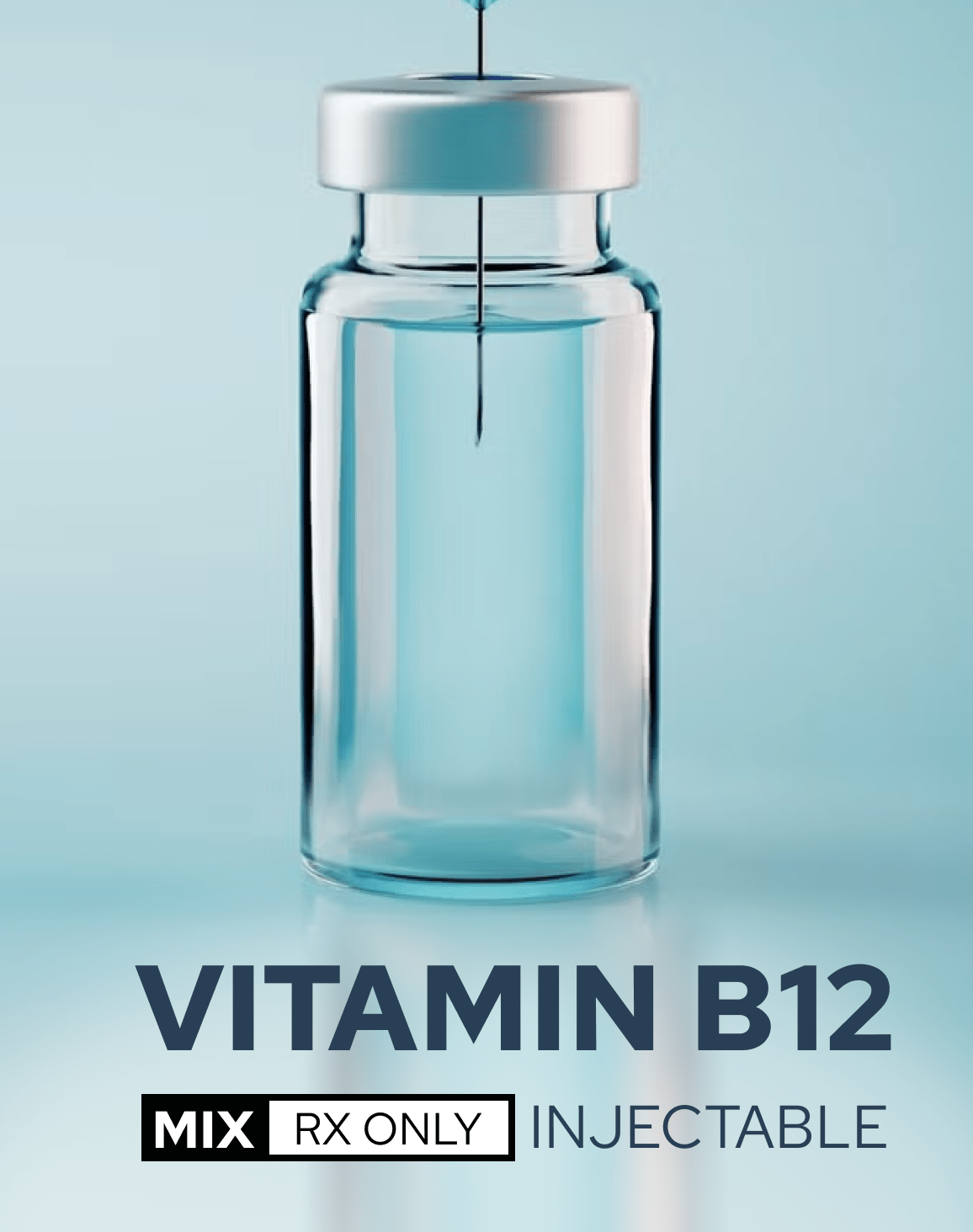What Is Vitamin B12 Injectable?
Vitamin B12 injectable, also known as hydroxocobalamin, is a high-quality, pharmaceutical-grade solution designed to treat vitamin B12 deficiencies. Vitamin B12 is essential for key metabolic processes, including energy production, nerve function, and red blood cell formation.
For healthcare providers, offering these injectables ensures that patients receive effective and reliable supplementation. This injectable is particularly beneficial for individuals who have trouble absorbing vitamin B12 through oral supplementation, such as those with gastrointestinal issues or certain medical conditions. It is important for maintaining healthy metabolism, blood cells, and nerve tissues. Regular use can support overall health and well-being, making it a valuable addition to any medical practice’s offerings.
How Should You Use Vitamin B12 Injectable?
Vitamin B12 injectable should be administered by a healthcare professional to ensure its effectiveness and safety. It is typically injected intramuscularly or subcutaneously, depending on the patient’s needs. The hydroxocobalamin B12 injection dosage can vary, but common initial doses are 1000 mcg weekly, followed by monthly maintenance doses.
Proper injection techniques are crucial; it’s essential to rotate injection sites to prevent tissue damage and ensure maximum absorption. Always follow standard sterile procedures to maintain patient safety. Healthcare providers should also monitor patients regularly to adjust dosages as needed. Ensure that patients are fully informed about the procedure to maximize comfort and compliance.
What Are the Possible Side Effects of Vitamin B12 Injectable?
While vitamin B12 injectables are generally safe, they can cause side effects in some individuals. Common side effects include mild pain, redness, or swelling at the injection site. Some patients may experience mild diarrhea or itching. More serious side effects, although rare, can include chest pain, shortness of breath, or severe weakness.
It’s important to closely monitor patients and report any unusual or severe reactions to a healthcare provider immediately. Knowing these potential side effects allows healthcare providers to manage any adverse reactions effectively and ensure patient safety. Regular follow-ups and patient education can help mitigate these risks.
Who May Interact with Vitamin B12 Injectable?
Various medications and conditions can interact with vitamin B12 injectables. Patients on medications like metformin, proton pump inhibitors, or certain antibiotics should discuss potential interactions with their healthcare providers. Additionally, individuals with specific medical conditions, such as polycythemia vera or certain blood disorders, need to consult their doctors before starting B12 injections.
Monitoring is crucial to avoid adverse interactions and ensure the effectiveness of the treatment. Always review a patient’s medical history and current medications to provide the safest and most effective care. Patient education on potential interactions can further enhance treatment safety and efficacy.
How to Use Vitamin B12 Injectable
Properly using vitamin B12 injectables is essential for achieving optimal results. Typically, healthcare providers administer these injections intramuscularly or subcutaneously. The initial dosage often involves 1000 mcg weekly injections for the first few weeks, transitioning to monthly maintenance doses. It’s important to follow sterile techniques and rotate injection sites to prevent tissue damage.
Always adhere to the specific guidelines provided by the healthcare provider and private label supplement manufacturers. Patients should receive clear instructions and support to understand the process and its benefits fully. Regular monitoring and follow-ups help adjust dosages and ensure the treatment achieves the desired outcomes effectively.
How Long Do Vitamin B12 Injectables Last?
The effects of vitamin B12 injectables can last from several weeks to a few months, depending on the individual’s metabolism and medical condition. For those with chronic deficiencies, continuous monitoring and regular administration are crucial to maintain optimal B12 levels. Healthcare providers often recommend follow-up assessments to fine-tune injection schedules for sustained effectiveness.
Ensuring that patients understand the importance of adhering to their injection schedule can significantly impact their overall health and well-being. Regular, managed dosing helps maintain stable B12 levels, supporting long-term health benefits and preventing deficiency-related complications.
Who Needs Vitamin B12 Injectables?
Vitamin B12 injectables are particularly beneficial for individuals who struggle to absorb vitamin B12 efficiently. They are crucial for those with gastrointestinal conditions, individuals who have undergone specific surgeries, or those with medical conditions affecting vitamin B12 absorption. These injectables provide an effective solution to ensure adequate vitamin B12 levels, promoting overall health.
Healthcare providers should identify and educate patients who would benefit most from this form of supplementation. By addressing vitamin B12 deficiencies proactively, practitioners can improve patient outcomes and quality of life.
People with Symptoms of Vitamin B12 Deficiency
Individuals exhibiting symptoms like fatigue, weakness, and neurological changes might need vitamin B12 injectables. Early intervention with these injections can prevent long-term health issues and improve patient quality of life. Symptoms can vary but often include cognitive difficulties, muscle weakness, and mood changes. Consulting with a healthcare provider can help diagnose and treat these symptoms effectively. Regular monitoring and follow-ups ensure that treatment is adjusted as needed to maintain optimal vitamin B12 levels, addressing deficiency-related symptoms efficiently.
Vitamin B12 Deficiency Risk Factors
Various factors increase the risk of vitamin B12 deficiency, including age, dietary habits, and medical conditions. Vegans, vegetarians, and older adults are particularly susceptible. Long-term use of certain medications can also impede vitamin B12 absorption. Regular screening and proactive supplementation, like vitamin B12 injectables, can help mitigate these risks. Healthcare providers should educate at-risk patients about the importance of monitoring and supplementing vitamin B12 to prevent deficiencies. Understanding these risk factors allows for early intervention and effective management of vitamin B12 levels.
People with Gastrointestinal Issues
Individuals with gastrointestinal conditions such as Crohn’s disease, celiac disease or those who have undergone bariatric surgery are at higher risk for vitamin B12 deficiency. These conditions can impede the body’s ability to absorb vitamin B12 effectively. For these patients, vitamin B12 injectables offer a reliable method to maintain adequate B12 levels. Healthcare providers should closely monitor these patients and provide regular injections to support their overall health. Proper management of vitamin B12 levels in these individuals is crucial for preventing deficiency-related complications and promoting well-being.
People with Symptoms of Vitamin B12 Deficiency
Individuals exhibiting symptoms like fatigue, weakness, and neurological changes might need vitamin B12 injectables. Early intervention with these injections can prevent long-term health issues and improve patient quality of life. Symptoms can vary but often include cognitive difficulties, muscle weakness, and mood changes. Consulting with a healthcare provider can help diagnose and treat these symptoms effectively. Regular monitoring and follow-ups ensure that treatment is adjusted as needed to maintain optimal vitamin B12 levels, addressing deficiency-related symptoms efficiently.
Vitamin B12 Deficiency Risk Factors
Certain lifestyle and medical factors increase the risk of vitamin B12 deficiency. Vegans and vegetarians, due to their diets lacking in B12-rich animal products, are at higher risk. Older adults and individuals with gastrointestinal disorders also face increased risks due to impaired absorption.
Long-term use of medications like metformin and proton pump inhibitors can further exacerbate deficiencies. Understanding these risk factors is essential for healthcare providers to offer timely and effective supplementation, such as vitamin B12 injectables. Early detection and intervention can significantly improve patient outcomes and prevent deficiency-related health issues.
For more information about the vitamin b12 injection price or to buy vitamin B12 injections, visit Legere Pharmaceuticals’ website today. Invest in the highest-quality, pharmaceutical-grade natural solutions for your patients’ health and well-being.
Contact us to learn more about our IV supplements, lipo mino mix injections, L-Carnitine Injections, Magnesium Chloride Injections, Acid Blend Injections, Ascorbic Acid Injections, Alpha Lipoic Acid Injections, Biotin Injections, liquid IV immune support, and other offerings through our website.
Jon Legere
Jon Legere is the Director of Marketing at Legere Pharmaceuticals, where he oversees all strategic marketing initiatives, brand development, and customer engagement efforts. With an MBA and 11 years of specialized experience in the dietary supplement industry, Jon brings a wealth of knowledge in consumer behavior, product positioning, and digital marketing strategies. His expertise has been pivotal in driving growth, innovation, and market share for Legere Pharmaceuticals, as he remains committed to promoting health and wellness through cutting-edge supplements.
Legere: Your Partner in Success

Ready to Start Growing Your Practice? Let’s Chat!
Schedule a no obligation/no-pressure call to quickly increase your weight loss clinic’s revenue.





